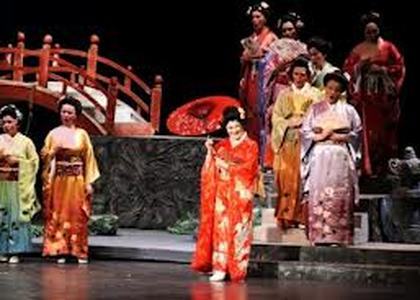> [Archived] Chronicles

Finally, 'Madama Butterfly' in Bucharest
Unfortunately, her partner (sort of...) was tenor Igor Țurcanu (from Chișinău), not at all involved in creating a credible Pinkerton, permanently singing with his face toward the conductor, immobile, even in... the love duet, the quality of his voice being heard only in the emphatically exposed high pitch, while remaining virtually non-existent for the rest of the play. And with Sharples, bariton Valentin Vasiliu was, as usual, impersonal and sure-footed, yet surpring, in the first act, through his 'octave' singing, even though I didn't notice any vocal problems later on, probably feeling as if he was at a rehearsal, attitude through which he was completely ignoring the fact that the audience... can hear and even know (at least partly) what he should... properly... intone. In contrast, mezzosoprano Oana Andra became a sensitive Suzuki, delicate and prolific, both from a vocal and a scenic standpoint, her voice perfectly 'matching' the soprano's, and not just in the famous duet of the second act.
With Goro, tenor Lucian Corchișwas fair but pretty liniar, bariton Florin Simionca had an adequate appearance with Yamadori, but...couldn't really be heard, bass Horia Sandu was far from the incisiveness of a... angry... Bonzo; other roles being performed with the same accuracy by soprano Cristina Eremia, baritone Vasile Chișiu or Adrian Ionescu. The choir sounded beautifully and homogenously (choir master - Stelian Olariu), as well as the orchestra that outlined the symphonic sequences with well differentiated hues, in which, unfortunately, the brasses had an exaggerated intensity, often covering the soloists' voices; but, possibly, this might have been the request of conductor Alexandru Samoilă (from Chișinău) who, once more at the BNO after a long absence, conducted now with firm and clear gestures, ensuring the logical construction of the musical speech, but also capturing the tempo changes that heavily tested the relationship with the audience as well as... the protagonist's breathing (especially the large aria).
Overall, the Puccinian opera performance was successful, the multitude of the audience confirming the fact that music lovers would wish to hear their beloved Madama Butterfly more often during the current season, generously cheering the performers, and especially Anda Pop, a soprano who deserves to be constantly invited to the BNO concerts, since the theatre does not have a proper soloist for the difficult role of the main character.
Translated by Bucur Adrian and Elena Daniela Radu
MTTLC, the University of Bucharest














